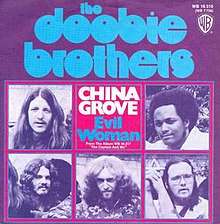China Grove (song)
"China Grove" is a song on the Doobie Brothers' 1973 album The Captain and Me. It was written and sung by original main singer/songwriter Tom Johnston.[2] The song reached number 15 on the Billboard Hot 100. While there is a real China Grove, Texas, Johnston's lyrics about the community are fictional. The song spent eight weeks in the Top 40.
| "China Grove" | ||||
|---|---|---|---|---|
 | ||||
| Single by The Doobie Brothers | ||||
| from the album The Captain and Me | ||||
| B-side | "Evil Woman" | |||
| Released | July 25, 1973 | |||
| Format | 7-inch single | |||
| Recorded | 1973 | |||
| Studio | Warner Bros. Studios, North Hollywood, Los Angeles | |||
| Genre | Hard rock, country rock[1] | |||
| Length | 3:16 | |||
| Label | Warner Brothers | |||
| Songwriter(s) | Tom Johnston | |||
| Producer(s) | Ted Templeman | |||
| The Doobie Brothers singles chronology | ||||
| ||||
Composition and recording
In 2010, examination of the master recording tape for the track by recording engineer Chris Baseford, revealed that, similar to most bands of the time, the band played together while tracking in the studio instead of overdubbing the instrumental elements; some guitar amp sound could be heard leaking into the drum tracks and some drum tracks leaking into the guitar track.
The production on the song was described as "pretty standard". Aside from the drums, panned slightly off center, there were some additional percussion, tambourine, and handclap overdubs. Baseford described the bass performance and sound on this song as "top notch" with Tiran Porter playing the melodic line using a pick and plugging directly into the mixing board.[3]
Origins
Like many songs by Johnston, the music was composed and developed before the lyrics were written. It started with a guitar riff that he and drummer John Hartman developed into a jam with a chord structure. Johnston said that the lyrics were influenced by a piano part in the performance. According to Johnston, "...I really owe Billy Payne for the words because he played this wacky bridge that started the thinking process with this wacky sheriff, samurai swords, and all that."[4]
The song is based on a real town in Texas. It has been reported that Johnston thought he had created a fictional town called "China Grove" near San Antonio and later learned it really exists from his cab driver in Houston. [5] Johnston later explained that the band had been on tour passing through the town of China Grove on the way to or from San Antonio, and he had seen a road sign with the name, but somehow had forgotten about it.[6]
Some writers may initially think that the song is about Asian people, noting that Johnston sings about "the sheriff and his buddies with their samurai swords" and the people "just keep on looking to the East." Then they conclude that, even though the community's name is real, the lyrics composed by Johnston must not be based on the actual population of the town because in reality, fewer than one-tenth of one percent of the residents are Asian. This is a cultural bias, resulting in a logical mistake to think that, if Johnston wrote about people who may be interested in Asia ("looking to the east") or who possess objects from Asia ("the sheriff and his buddies"), they must be Asian. A simple explanation for the Samurai swords in America is the forced disarmament of the Japanese population in 1945, when thousands of confiscated swords were taken as souvenirs by returning US soldiers.[7] A simple explanation for the name of the town is its history as the site of a plantation that had a grove of chinaberry trees.[8]
Chart performance
Weekly charts
|
Year-end charts
|
References
- Stuyt, Chelsey (November 17, 2014). "The Doobie Brothers' 'Southbound' a Jukebox of Greatest Hits". Vancouver Weekly. Retrieved April 28, 2019.
- Spatz, David J. (April 29, 2010). "Listen to the Doobies". Atlantic City Weekly. Retrieved August 5, 2012.
- Chris Baseford June 16, 2010 (June 16, 2010). "Secrets of the Masters: The Doobie Brothers "China Grove"". Premierguitar.com. Retrieved November 26, 2015.
- Meeker, Ward (August 4, 2012). "Doobie Brothers: A Discussion with Tom Johnston and Patrick Simmons". Vintage Guitar. Retrieved August 5, 2012.
- , by Adam Reader, of Professor of Rock, 2018.
- Interview of Tom Johnston, by Carl Wiser, of Songfacts, October 8, 2009.
- https://www.quora.com/What-happened-to-surrendered-Japanese-swords-katanas-and-such-swords-that-were-both-owned-by-military-and-family-owned-required-by-the-US-occupying-forces?share=1
- http://www.texasescapes.com/TexasGulfCoastTowns/China-Grove-Texas.htm
- "Item Display - RPM - Library and Archives Canada". Collectionscanada.gc.ca. 1973-10-27. Retrieved 2018-06-08.
- RPM Adult Contemporary, October 6, 1973
- [Joel Whitburn's Top Pop Singles 1955–2002]
- "Cash Box Top 100 10/20/73". cashboxmagazine.com. October 20, 1973. Retrieved May 7, 2016.
- Canada, Library and Archives (July 13, 2017). "Image : RPM Weekly".
- Whitburn, Joel (1999). Pop Annual. Menomonee Falls, Wisconsin: Record Research Inc. p. 316. ISBN 978-0-89820-142-0.
External links
- Lyrics of this song at MetroLyrics
- 020374 Old Grey Whistle Test - Doobie Brothers at youtube.com